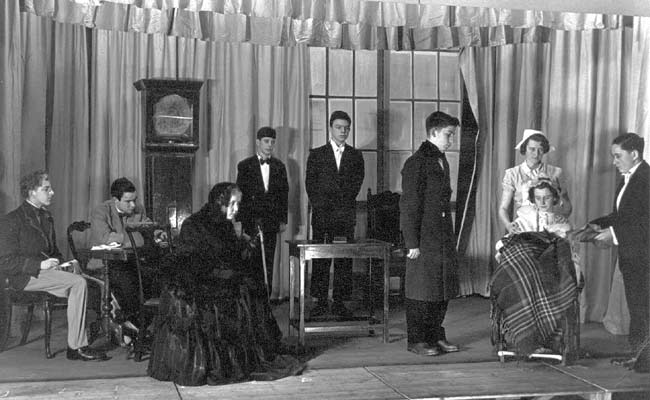 |
The Lady With The Lamp - 1955Productions Index | Homepage | Email us |

'The Lady with the Lamp' was produced by Mr Davis in conjunction with the Old Scholars' Association. The play ran for three nights round about 8 December 1955. Tickets unreserved cost 1/6d!
John Cunningham sent us the photo and Janet Haynes has helped with names,
though some identifications are tentative. Some people played more than one
part and old scholars also took part.
|
|
Cast: (taken from programme) |
|
The following appeared in the 1956 School Magazine:- The School presented at Christmas "The Lady with a Lamp" by Reginald Berkeley. Although written as a play in four acts, this work is really a chronicle of the remarkable career of Florence Nightingale from 1848 to 1907. Florence is not presented by Mr. Berkeley as a sympathetic character; we are given a glimpse of her cutting wit, impatience with officialdom and red tape and ruthless over-riding of obstacles. She is revealed as having driven to their deaths her admirer Lord Herbert and the only man she loved, Henry Tremayne. And yet the last word remains with Herbert's widow Elizabeth who says that the purgatory of some people may be to live on after their senses have departed "unable to work, unable to die." In the final scene the tragic truth is brought home to us when we see Florence, old and helpless, being presented with honours she has earned but unable to appreciate their significance. This production was a joint effort of the Old Scholars' Association and the School. It is extremely difficult for young people to present mature characters, particularly where these characters have to age during the performance, and all acquitted themselves creditably, especially so when we bear in mind the size of the stage where three steps taken in anger are sufficient to land an actor in the wings! In the leading part of Florence, which she took on at five weeks' notice, Miss Preston put across with conviction her ruthless character. On stage for all but a small part of the two-and-a-half-hour performance, she earned the admiration and praise of the audience. Pat Bevis as Elizabeth Herbert, friend, obstructor, rival and finally antagonist of Florence, gave a performance which was noteworthy; it will be a long time before we forget the pathos of the moment when she came in with the news of her husband's death. This was a part which required moods, the flippant, businesslike, ruthless, mourning and contemplative; they were all conveyed with conviction. As Lord Palmerston, John Meachen conveyed the elder statesman to the life. We felt that he was completely master of the situation and really lived the part. Malcolm Fry as the Scots Doctor Sutherland provided the needed touch of humour and evoked admiration for his accent. Thomas Bradford as Lord Herbert was very natural as the rising politician at the beginning and very moving as the rich man who would be dead in a few weeks. Raymond Wright was particularly "lifelike" as the fatally injured admirer of Florence brought in to die at her feet. Marion Godfrey as Mrs. Nightingale gave us a convincing performance as the mother of genius, impatient at first, then disbelieving and finally proud but ashamed of her original doubts. Terence Nunn as the Corporal, a character whose purpose is the same as the Porter in Macbeth, provided the much-needed comedy at the appropriate moment. Other parts were played by Carol Beard, John Brown, John Cunningham, Sylvia Goodwin, Peter Hough, Rosemary Kitchen, Susan Laban, Geoffrey Lane, Eileen Pratt, Margaret Puttock, Barbara Reeves, Norman Rigo, Winnie Russell and Robert Williams. The backcloth, which was provided by the Parent-Teacher Association, was designed and painted by Miss Brooker, Tony Brace and Malcolm Fry. It was difficult to believe that it was not a professional job. The beauty of the opening scene, in which the backcloth figured, was enhanced by the properties made under the direction of Mr. Cole, the masterpiece being a fountain that worked! Make-up was in the hands of Mrs. Denman, Mrs Jenner, Mrs. Parker and Miss Stern. We are grateful to Mrs. Denman and Miss Stern for taking this on at short notice. Many properties were loaned by the Thermads, the Dramatic Society of the Eastern Gas Board, to whom we owe thanks. Mrs Denman and Mrs. Godfrey altered the costumes. Thanks are also due to the noble band of scene shifters who dealt capably with the great amount of scene shifting which had to be done. The play ran for three nights. The producer and those taking part were disappointed by the small audiences and the poor support given by the parents and old scholars. This was a difficult production which received high praise from those well entitled to judge; it is discouraging to feel that such efforts are not sufficiently appreciated. |